Faith and Politics
Muslim civil rights groups are calling a new Kansas law that bans Shariah in state courtrooms an expression of Islamophobia that is vulnerable to a legal challenge.
The law, signed by Republican Gov. Sam Brownback on Monday (May 28), does not specifically mention Shariah, or Islamic law, but forbids state courts from basing decisions on foreign laws that contradict rights granted by the U.S. Constitution and state constitutions.
But the Council on American-Islamic Relations and other Muslim groups called the law little more than anti-Muslim propaganda.
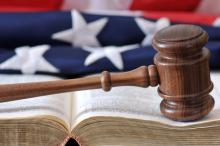
Most people with some sense of universal human dignity have found the screed Pastor Charles Worley issued against the GLBT community from the pulpit recently repugnant. As a Christian who tires of being lumped together with such hateful, violent voices cloaking themselves within the protection of their faith, I can say with confidence that there is nothing about Worley’s rhetoric that is Christian, as I understand it.
But some believe he did more than just smear the image of the Christian faith and denigrate an entire cross-section of the population; some suggest he actually broke the law from the pulpit.
Americans United for Separation of Church and State‘s Barry W. Lynn submitted a letter to the Internal Revenue Service arguing that Worley violated his church’s 501(c)3 nonprofit status by interfering in an election while speaking on behalf of his church.
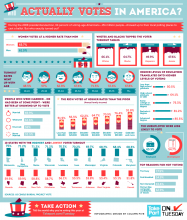
Take Part on Tuesday has created to great infographic that shows who actually votes in America.
Some of the highlights:
- Married people are more likely to vote than widowers, divorcees or those who have never been married.
- The higher the level of education you have received, the more likely you are to vote.
- More than 9-in-10 people with an annual family income of over $100,000 vote, compared with just 5-in-10 whose income falls below $20,000.
- Our busy lives are the number one reason why we don’t vote.
- Congratulations to Minnesotans – your state tops state-by-state voter turnout with 75%
- Must do better: Hawaii - only half of Hawaiians voted in the 2008 election.
U.S. Catholic bishops have used the Obama administration’s contraception mandate as Exhibit A in their high-stakes defense of "religious freedom." But it’s not just the bishops who are fuming, and it’s not only over contraception.
Like-minded religionists of several denominations – including Southern Baptist leader Richard Land and Baltimore Archbishop William Lori -- gathered in Washington Thursday (May 24) to organize a response to what they see as the sorry state of religious freedom in America today.
“We must all be willing to stand up and tell the government ‘no,’” said Land, who heads the Southern Baptist Convention's Ethics & Religious Liberty Commission. “Secularists don’t like people of faith because the ultimate authority for us is not the state. The ultimate authority is God.”
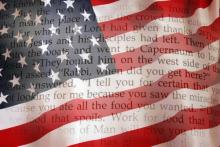
Both religion and politics are concerned with how we should organize societies. Yet the tendency for Christians has often been to begin with the politics and work backwards to find religious rationale for our political beliefs. As a result, most people read the Bible not to challenge our deeply held beliefs, but to affirm the decisions we've already made with our lives.
If you tend toward the political right you might say the chief political concern of the Scriptures has as much to do with smaller government, lower taxes, individual freedoms and gun rights as any explicit Christian concept.
If you tend toward the political left you might believe the chief political concern of the Scriptures has more to do with reproductive rights, religious pluralism, big government and labor unions.
Too often the ideologies of the secular right or the political left have been allowed set the terms for religious Christians.
The Huffington Post's Senior Religion Editor, Paul Brandeis Raushenbush, interviews civil rights leader Rep. John Lewis. Lewis says:
The church should be out front leading the way, and be a headlight rather than a taillight. If you are going to live up to the teachings of the Great Teacher, and follow in the tradition of the great leaders of faith, you have to be out there, shining the light, preaching the Good News and living the Good News. You have to make it real.
Read the full interview here
This week is one of those weeks where everyone seems to be talking, tweeting and blogging about the same video. I received it from several concerned friends with commentary like, “More bad news from North Carolina,” or “How can a loving God hate so much?” The video, which has quickly gone viral in the past 24 hours, is a clip from a recent sermon by Pastor Charles L. Worley of Providence Road Baptist Church in Maiden, North Carolina.
Following President Obama’s endorsement of same-sex marriage, pastor Worley took to the pulpit to rage against the issue of “queers and homosexuals”. However, it is his proposed “solution” to the “problem” (eerily reminiscent of Hitler’s “Final Solution”) that has the blogosphere abuzz (read: up in arms).
Worley proudly pronounces that he has found a way to get rid of all of the “lesbians and queers”: lock them all inside a fenced-off area and simply wait for them to die out on account of their inability to reproduce. In the video, his pronouncement garnered several hearty “Amens” from the congregation.
Unfortunately, this explosive video is just the most recent in a long stream of gay-marriage-related stories making headlines from my home state of North Carolina. After all, mine is the state that just passed the draconian amendment to its constitution, commonly known as “Amendment One”, banning same-sex marriage and all domestic and civil unions (never mind the fact that same-sex marriage is already illegal in our state). It seems that a day does not go by where I don’t hear a quote or read an article where another pastor has taken to the pulpit to remind his congregation that “homosexuality is wrong and against the Bible!”
This breaks my heart.
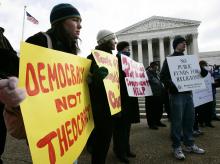
With the 2012 election less than six months away, congregations are getting the message that Americans want religion out of politics. But that doesn’t mean they plan to keep mum in the public square.
Instead, they’re revamping how congregations mobilize voters by focusing on a broader set of issues than in the past. Preachers are largely avoiding the political fray, and hot-button social issues are relegated to simmer in low-profile church study groups.
Why? For one, Americans are growing impatient with religious politicking: 54 percent want houses of worship to keep out of politics (up from 52 percent in 2008 and 43 percent in 1996), according to the Pew Forum on Religion & Public Life. Churches seem to be responding.

Nearly a quarter of a century after DNA testing was used to prove that a defendant had been falsely convicted of a crime, the American public has become familiar with the phenomenon and how the script plays out in our courtrooms.
The exonerated defendant stands before a judge and is informed that the conviction is vacated and the charges are dismissed. And then the former inmate —more than 100 have come from Death Row — is joined by family members and lawyers in a celebration on the courthouse steps.
Yes, it is a joyous occasion to step from behind prison bars after years — as many as 30 years in one case —of being locked up for a crime that was not committed.
But, as a report issued Monday by the National Registry of Exonerations makes clear, behind every one of these jubilant moments are tragedies, some of them of enormous proportion.
The report documents nearly 900 individual cases of exoneration. Combined, these (mostly) men and women served more than 10,000 years in prison for crimes they did not commit. In fact, in more than 100 cases, there was no crime at all — accidents were mischaracterized as murders and crimes were just concocted based on a web of lies and falsehoods.
As reported by Alan Duke for the CNN Belief Blog:
The University of Notre Dame and "a diverse group of plaintiffs" filed lawsuits Monday challenging the federal mandate that religious employers offer health insurance that includes coverage of contraceptives and birth control services, Notre Dame spokeswoman Shannon Chapla said. The Notre Dame suit, filed in the U.S. District Court in Northern Indiana, is one of a dozen filed Monday by 43 separate Catholic institutions in different federal courts around the United States, Chapla said.
Read the full story here
Writing for The Washington Post, Lisa Miller writes:
People always ask, “What would Jesus do?,” but in America today, it’s impossible to know. And that’s because there are (at least) two prevailing views of God at work in our public and political conversation. It would not be an exaggeration to say that when you pull the lever this November, you will not just be voting for president. You will be saying what you believe about God.
Read her full article here
House budget chairman Paul Ryan and Senate assistant majority leader Dick Durbin discuss debt challenges and austerity on Meet The Press over the weekend.
According to Ryan: "The whole premise of our budget is to preempt austerity by getting our borrowing under control, having tax reform for economic growth, and preventing Medicare, Social Security and Medicaid from going bankrupt."
Politico reports that Ryan's argument follows Republican arguement that cutting those programs now will prevent future economic hardship, and later on, save them.
Visit msnbc.com for breaking news, world news, and news about the economy
In advance of two days of meetings with G8 leaders at Camp David this weekend, on Friday morning, President Obama spoke to a gathering of international political and NGO leaders and activists in Washington, D.C. at the Symposium on Global Agriculture and Food Security.
THE PRESIDENT: Thank you so much. (Applause.) Thank you, everybody. Please have a seat. Thank you. Well, good morning, everybody. Thank you, Catherine Bertini, and Dan Glickman and everyone at the Chicago Council. We were originally going to convene, along with the G8, in Chicago. But since we’re not doing this in my hometown, I wanted to bring a little bit of Chicago to Washington. (Laughter.) It is wonderful to see all of you. It is great to see quite a few young people here as well. And I want to acknowledge a good friend. We were just talking backstage -- he was my inspiration for singing at the Apollo -- (laughter) -- Bono is here, and it is good to see him. (Applause.)
Now, this weekend at the G8, we’ll be represented by many of the world's largest economies. We face urgent challenges -- creating jobs, addressing the situation in the eurozone, sustaining the global economic recovery. But even as we deal with these issues, I felt it was also important, also critical to focus on the urgent challenge that confronts some 1 billion men, women and children around the world -- the injustice of chronic hunger; the need for long-term food security.
WATCH PRESIDENT OBAMA AT 2:28:45
If you have read books like Drew Westen’s The Political Brain, you might be forgiven for raising an eyebrow at this headline. A large body of work has emerged over the past few years that suggest that we vote with our hearts, rather than our heads. Policies, this body of work says, matter far less than our gut reaction to a candidate, their character and the party we naturally align ourselves with.
So to those who agree with this research, the results of a new report from the Barna Group might be surprising. Across the board, a candidates’ position on issues is overwhelmingly more important than their character, their party affiliation or their religious faith.
According to a new report from the Barna Group:
A national sample of likely voters interviewed by Barna indicated that of all the different factors they will consider when choosing our next president, each candidate’s positions on important issues will be the single most important component in their candidate choice. More than four out of five likely voters (83%) said that positions on the issues are the most important factor in their decision of which candidate to support on Election Day.
See the full results of the report here
 My generation is a practical generation, and I am challenged by my faith to be a practical person. Don’t get me wrong: I love all verbal and theological things: story, theology, politics, and history, perhaps even inordinately.
My generation is a practical generation, and I am challenged by my faith to be a practical person. Don’t get me wrong: I love all verbal and theological things: story, theology, politics, and history, perhaps even inordinately.
But I believe in places. I believe that relationships, rooted in love, transform us. And it just so happens that most lasting human relationships are formed around the table....
The table is a place where we bypass rank and privilege and create a zone where you take what you need and bring what you are able. It is a commons where we are defined in new, equal relationships with one another, ensuring that all have enough and sharing. Believers in Acts took the idea of the common table even further and held all possessions in common, caring for the widows and dispossessed from the surplus, bypassing the inequality created by the currency stamped with the deified Caesar.
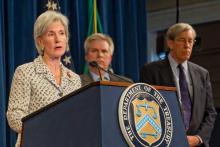
Tensions between the Archdiocese of Washington and Georgetown University are escalating ahead of an address on Friday (May 18) by Health and Human Services Secretary Kathleen Sebelius, a conflict that is becoming a microcosm of the political battles raging inside the Catholic Church.
Sebelius, a Catholic whose support for abortion rights and President Obama’s contraception insurance mandate has infuriated bishops and conservative Catholics, was chosen last fall by students at Georgetown’s Public Policy Institute to deliver a speech at the school’s annual awards ceremony on commencement weekend.
The event will be one of Georgetown’s 18 awards programs this weekend – there are 10 other official commencement ceremonies – and Sebelius will not receive an honorary degree.
NORTHAMPTON, Mass. – Poor memory? Hard to say. I'm just glad I don't remember details of my college road trips to Northampton and my .000 batting average with Smith College women.
That means I can approach stopping by this charming college town as a pleasant diversion with my wife after a family lunch in nearby Worcester. I can escape shadows of feeling lost among the hyper-sophisticated Smithies. Some history deserves to be forgotten.
Moreover, what merits remembering requires reflection and fresh engagement, not just a sense of cyclical dread.
The ugly political morass of 2012 isn't just Reaganism redux: It's not just another variation on the "trickle-down" delusion – make the rich rich enough and they will discover how to share – and the economic and political destruction that flowed from chasing that fantasy. Nor is it another dabbling in McCarthyism's politics of fear and scapegoating.
Writing for Religion News Service and featured in The Washington Post, Tom Ehrich has some strong words for the culture of fear and distortion he sees in politics:
When people make grandiose claims about “God’s will” and “American values” and demonize others who hold different views, we haven’t just channeled a tragic yesterday and its wars and pogroms. We have poisoned the well of community on which our nation depends today and made a mockery of God and faith.
Read his full article here.
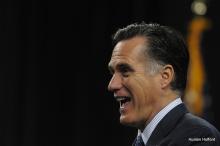
It's no wonder that Mitt Romney won plaudits from evangelical bigwigs for his commencement speech at Liberty University on Saturday. It showed he's learned how to talk to them--or at least, learned to listen to the people who know how he's supposed to talk to them.
When he was running for president last time, Romney told the bigs that he was pretty much like them in considering Jesus his Lord and Savior. But if there's anything evangelicals don't like, it's Mormons claiming to be Christians like them. Then he gave a speech declaring that, like a presidential candidate half a century earlier, he did not "define my candidacy by my religion. A person should not be elected because of his faith nor should he be rejected because of his faith." But evangelicals (these days) don't much believe in Kennedyesque separation of faith and public office.